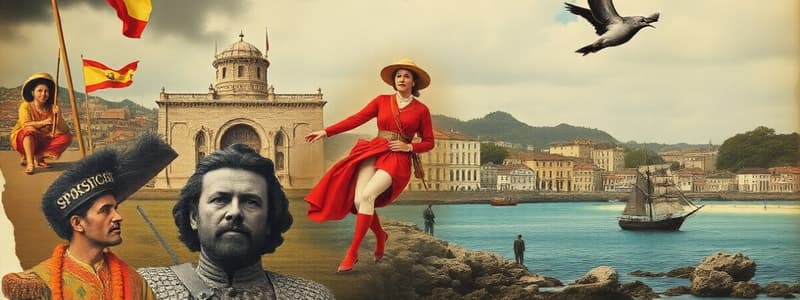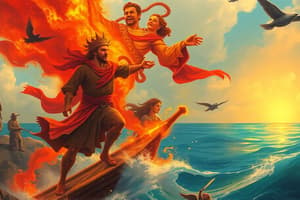Podcast
Questions and Answers
What is the primary focus of the provided content?
What is the primary focus of the provided content?
- Literary predictions of bloodshed
- Personal accounts of 16th-century explorers
- Historical events in New York
- Support dynamics in regional conflicts (correct)
Which date is mentioned in relation to the events described?
Which date is mentioned in relation to the events described?
- 1600
- 2100
- 1520 (correct)
- 1958
What element does the content imply may have been affected by the historical events in 1520?
What element does the content imply may have been affected by the historical events in 1520?
- Fashion trends
- Regional power dynamics (correct)
- Literary contributions
- Technological advancements
What kind of support is highlighted as important in the content?
What kind of support is highlighted as important in the content?
Which aspect of bloodshed is implied to have been significant during the events discussed?
Which aspect of bloodshed is implied to have been significant during the events discussed?
Flashcards
Bloodless Conquest
Bloodless Conquest
A conquest or takeover accomplished without bloodshed, often through diplomacy or strategic maneuvering.
Winning Support of Surrounding Area
Winning Support of Surrounding Area
The process of gaining support or allegiance from people or groups in a particular region.
Predictability
Predictability
The ability to predict or anticipate future events or outcomes.
Continuation
Continuation
Signup and view all the flashcards
Exertion of Control
Exertion of Control
Signup and view all the flashcards
Study Notes
The Spanish Invasion
- Spanish explorers, led by figures like Columbus, arrived in the Caribbean in 1492, encountering native inhabitants.
- Initial encounters were marked by astonishment on both sides, with the natives surprised by the Europeans' appearance and the Europeans disappointed by the lack of expected riches.
- Subsequent voyages to the Americas resulted in limited settlement due to financing challenges, as expected trade goods weren't found.
- Leaders like Columbus faced administrative difficulties with governing colonists and were eventually removed from their positions.
- Indigenous peoples were often relegated to the status of "others" and exploited for labor.
- Economic motivations, including the desire for gold and other resources, strongly influenced Spanish colonization efforts.
- Religious motivations, including the spreading of Catholicism, were intertwined with economic and political goals.
Spanish Legacies and Caribbean Trials
- The Spanish conquests in the Caribbean and other parts of the Americas were influenced by the Reconquista, a recent victory over Muslim forces in Spain
- The blending of military conquest, religious zeal, and the pursuit of riches shaped the pattern of colonization.
- The early expeditions had financial backing from individuals and the crown, creating incentives for successful expansion and exploitation of wealth
- The scarcity of riches initially led to a lack of sustained settlement and administrative neglect, creating space for factions and personal gain within the Spanish administration.
- Spanish colonization policies led to significant loss of indigenous lives, due to disease and mistreatment.
Who Were the Spaniards?
- The Iberian peninsula had a history of conquest.
- After the Roman Empire, Visigoths and Muslims controlled parts of the peninsula.
- Iberians gradually reclaimed the territory.
- The region's diverse cultures and languages persisted throughout this period.
- Castile emerged as a dominant kingdom, shaping the future Spanish monarchy.
- The marriage of Isabella of Castile and Ferdinand of Aragorn in 1469 strengthened the Crown and created institutions aimed at managing the nobility and municipalities..
- Spain developed centralized institutions of governance during the era of major colonial expansion in the Americas.
The Spanish Invasion - Further Details
- Initially, Spanish conquistadors prioritized the search for gold and other valuable resources in the Americas.
- Their tactics and strategies were often based on a combination of military force and alliances or coercion with local groups.
- Expeditions aimed to acquire lands and wealth and to establish Spanish rule and settlements.
- Early Spanish authorities had to deal with internal conflicts and disputes amongst themselves, often leading to conflicting approaches and outcomes for governing the native populations.
- A sense of religious crusade existed alongside the material desire for gain.
Fernando Cortés
- Cortés was a conquistador who led an expedition to the Yucatán and subsequently conquered the Aztec Empire.
- Cortés was inspired by narratives of previous conquerors and sought wealth through military adventure within a framework of religious righteousness.
- He faced resistance but ultimately succeeded in conquering the Aztec Empire using alliances, military force, and exploiting existing tensions amongst the empire's population
- He founded settlements and established Spanish authority in the region.
The Initial Reception/The Fall of Tenochtitlan
- Cortés made alliances with local groups, leveraging existing rivalries and discontent to expand his influence.
- Cortés made alliances with indigenous groups like the Tlaxcalans who were enemies of the Aztecs.
- Cortés faced challenges in his conquest, including logistical problems, disease, and resistance.
- The Spanish employed both military force and diplomacy in their interactions with the indigenous people.
- The siege and destruction of Tenochtitlan (modern Mexico City) was a pivotal moment in Spanish conquest of the region.
- The conquest represented a clash of civilizations, with devastating consequences for the indigenous population in terms of loss of life, culture, and independence.
Studying That Suits You
Use AI to generate personalized quizzes and flashcards to suit your learning preferences.



